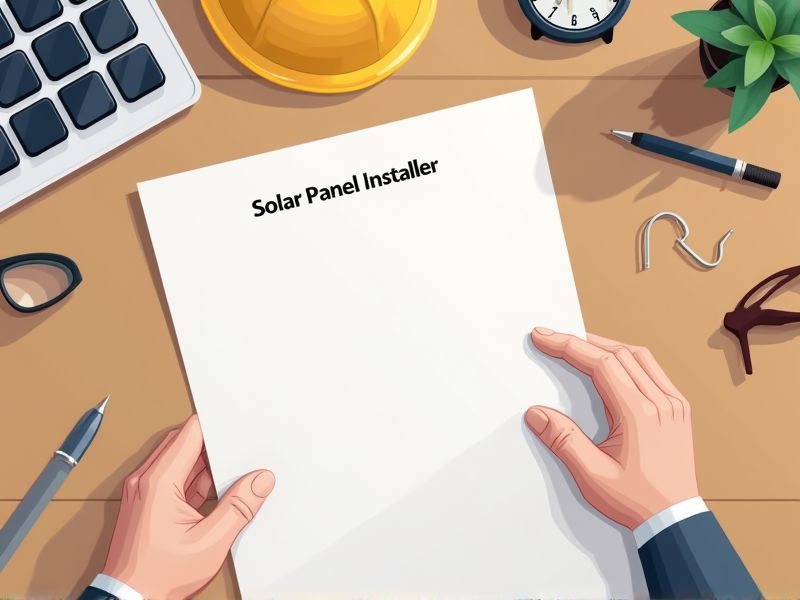
Solar panel installers require specific certifications due to the inherent complexities and risks associated with solar energy systems. Certifications ensure that installers possess the necessary technical knowledge and skills to safely and effectively handle electrical components and installation procedures. Proper certification also enables compliance with governmental and industry standards, which is critical for both liability and warranty purposes. Here are some essential certifications you may need as a solar panel installer.
NABCEP PV Installation Professional Certification
The NABCEP PV Installation Professional Certification serves as a benchmark for verifying expertise and competence in solar panel installation, enhancing consumer trust and industry credibility. Certified installers are more likely to adhere to safety and quality standards, reducing risks and potential liabilities on job sites. With this certification, professionals find increased opportunities for career growth and higher earning potential due to the growing demand for qualified solar technicians. Installation companies often require or prefer this certification, positioning it as a competitive advantage in the solar industry.
NABCEP PV Technical Sales Certification
Achieving the NABCEP PV Technical Sales Certification enhances credibility, making solar panel installers more attractive to potential clients. Certification demonstrates a comprehensive understanding of PV system specifications, which can improve the accuracy of sales proposals. It often leads to increased job opportunities as it signifies a commitment to the highest industry standards. Certified individuals contribute to more effective and efficient project management, reducing overall project costs and improving customer satisfaction.
NABCEP Associate Certification
NABCEP Associate Certification provides foundational knowledge, ensuring solar panel installers have a solid understanding of photovoltaic systems. This certification helps instill confidence in customers, as it signifies the installer is committed to professionalism and quality. Certification often leads to better job prospects and career advancement, as employers prioritize certified installers. By meeting industry standards, certified installers can reduce installation errors, thereby improving system performance and customer satisfaction.
OSHA 10 Construction Safety Certification
OSHA 10 Construction Safety Certification is needed for solar panel installers to ensure they understand necessary safety protocols and reduce the risk of accidents on job sites. The certification provides knowledge on hazard recognition, enabling installers to identify potential dangers and implement preventive measures effectively. This training meets industry standards, which can enhance the credibility of installers with employers and clients prioritizing safety compliance. By promoting safer work environments, the certification ultimately contributes to longer-term job sustainability and reduces liability issues for companies.
OSHA 30 Construction Safety Certification
OSHA 30 Construction Safety Certification equips solar panel installers with the necessary knowledge to recognize and mitigate safety hazards on construction sites. Construction sites inherently present various risks, including falls and electrical hazards, which the certification addresses comprehensively. By understanding specific safety protocols, installers can minimize accident rates and ensure compliance with federal safety regulations, reducing potential liability. Companies employing certified installers often experience enhanced safety records and operational efficiency, promoting better workplace environments.
State Electrician License
State electrician licenses ensure that solar panel installers have the necessary technical knowledge and skills. This licensing requirement helps prevent improper installations that could lead to electrical hazards or inefficiencies. Licensed electricians adhere to established safety standards, minimizing risks to both installers and homeowners. The regulation fosters consumer confidence, promoting higher adoption rates of solar technology.
Certified Electrical Installer Certification
Certified Electrical Installer Certification ensures solar panel installers have the necessary knowledge to handle electrical systems safely. The certification process verifies that installers understand local and national electrical codes, which reduces the risk of faulty installations. Proper certification increases consumer confidence in the installer's skills and improves overall industry standards. Installation errors can lead to increased costs and hazards, whereas certified professionals help mitigate these issues.
EPA Lead Renovation Certification
EPA Lead Renovation Certification is necessary for solar panel installers because it ensures they are trained to handle and mitigate lead paint hazards in older homes where lead-based paint is prevalent. In homes built before 1978, disturbing lead-based paint during solar panel installation poses risks of lead exposure, potentially causing health issues like neurological damage, especially to children. This certification helps installers implement lead-safe work practices, reducing potential legal and financial liabilities due to lead contamination. Without the certification, companies risk non-compliance with federal regulations, resulting in fines and damage to their reputation.
Building Performance Institute (BPI) Building Analyst Certification
Obtaining the Building Performance Institute (BPI) Building Analyst Certification enables a solar panel installer to assess a building's energy efficiency comprehensively. By understanding a structure's energy dynamics, installers can recommend solar solutions that maximize energy savings and performance. This certification ensures proficiency in identifying and alleviating energy inefficiencies, aligning solar panel systems with optimal building operation. With a certified understanding, installers deliver tailored solar options that enhance both energy conservation and customer satisfaction.
Working at Heights - Fall Protection Training Certification
Working at heights poses significant risks, and proper fall protection training certification equips solar panel installers with essential safety knowledge. This training helps them understand and implement the necessary safety measures to prevent falls and related injuries. Certification ensures that installers are compliant with industry standards and legal safety regulations, reducing potential liabilities for employers. By being properly trained, installers can enhance onsite efficiency and decrease downtime caused by accidents or safety concerns.
Summary
By obtaining certifications in solar panel installation, you enhance your credibility and trustworthiness in the eyes of potential clients. This often leads to increased job opportunities and higher earning potential as clients prefer certified professionals. Employers are more likely to hire or promote you due to your demonstrated commitment to industry standards. You gain specialized knowledge, reducing the likelihood of installation errors and improving overall customer satisfaction.
